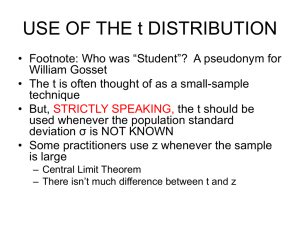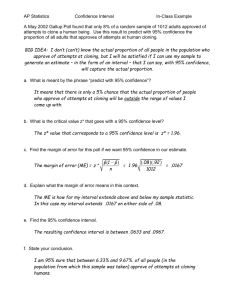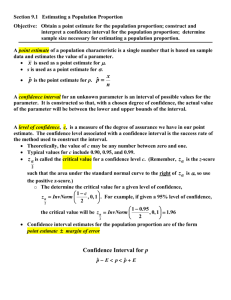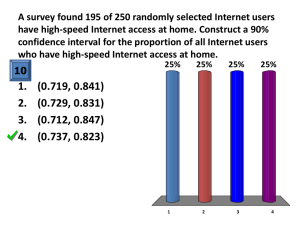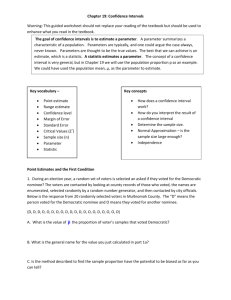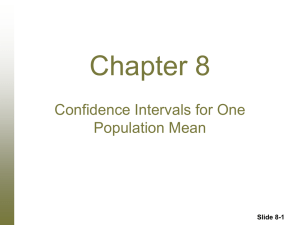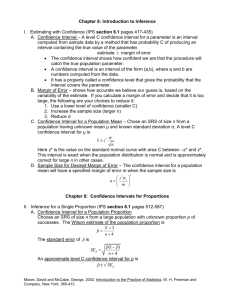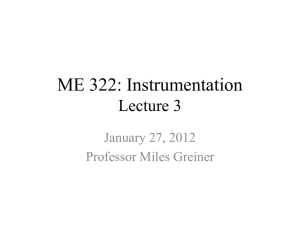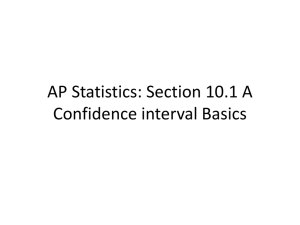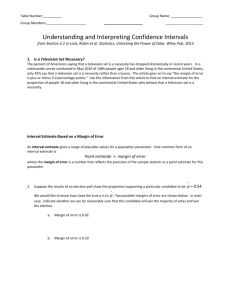STAT 515 -- Chapter 7: Confidence Intervals
advertisement
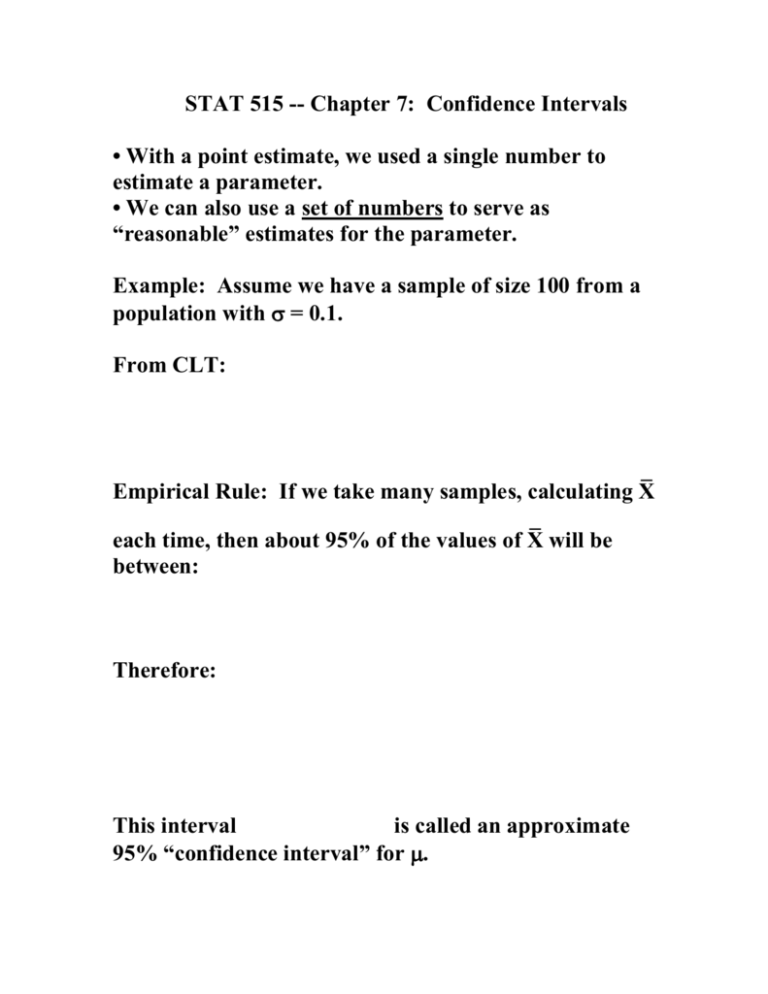
STAT 515 -- Chapter 7: Confidence Intervals • With a point estimate, we used a single number to estimate a parameter. • We can also use a set of numbers to serve as “reasonable” estimates for the parameter. Example: Assume we have a sample of size 100 from a population with = 0.1. From CLT: _ Empirical Rule: If we take many samples, calculating X _ each time, then about 95% of the values of X will be between: Therefore: This interval is called an approximate 95% “confidence interval” for . Confidence Interval: An interval (along with a level of confidence) used to estimate a parameter. • Values in the interval are considered “reasonable” values for the parameter. Confidence level: The percentage of all CIs (if we took many samples, each time computing the CI) that contain the true parameter. Note: The endpoints of the CI are statistics, calculated from sample data. (The endpoints are random, not the parameter!) _ In general, if X is normally distributed, then in 100(1 – )% of samples, the interval will contain . Note: z/2 = the z-value with /2 area to the right: _ 100(1 – )% CI for : X ± z/2( / n) Problem: We typically do not know the parameter . We must use its estimate s instead. Formula: CI for (when is unknown) X Since s / n has a t-distribution with n – 1 d.f., our 100(1 – )% CI for is: where t/2 = the value in the t-distribution (n – 1 d.f.) with /2 area to the right: • This is valid if the data come from a normal distribution. Example: We want to estimate the mean weight of trout in a lake. We catch a sample of 9 trout. Sample _ mean X = 3.5 pounds, s = 0.9 pounds. 95% CI for ? Question: What does 95% confidence mean here, exactly? • If we took many samples and computed many 95% CIs, then about 95% of them would contain . The fact that contains “with 95% confidence” implies the method used would capture 95% of the time, if we did this over many samples. Picture: A WRONG statement: “There is .95 probability that is between 2.81 and 4.19.” Wrong! is not random – doesn’t change from sample to sample. It’s either between 2.81 and 4.19 or it’s not. Interpreting a 95% Confidence Interval: TRUE or FALSE? (1) 95% of all trout have weights between 2.81 and 4.19 pounds. _ (2) 95% of samples have X between 2.81 and 4.19. (3) 95% of samples will produce intervals that contain . (4) 95% of the time, is between 2.81 and 4.19. (5) The probability that falls within a 95% CI is 0.95. (6) The probability that falls between 2.81 and 4.19 is 0.95. Level of Confidence Recall example: 95% CI for was (2.81, 4.19). • For a 90% CI, we use t.05 (8 d.f.) = 1.86. • For a 99% CI, we use t.005 (8 d.f.) = 3.355. 90% CI: 99% CI: Note tradeoff: If we want a higher confidence level, then the interval gets wider (less precise). Confidence Interval for a Proportion • We want to know how much of a population has a certain characteristic. • The proportion (always between 0 and 1) of individuals with a characteristic is the same as the probability of a random individual having the characteristic. Estimating proportion is equivalent to estimating the binomial probability p. Point estimate of p is the sample proportion: x ˆ p Note n is a type of sample average (of 0’s and 1’s), so CLT tells us that when sample size is large, sampling distribution of p̂ is approximately normal. For large n: 100(1 – )% CI for p is: How large does n need to be? Example 1: A student government candidate wants to know the proportion of students who support her. She takes a random sample of 93 students, and 47 of those support her. Find a 90% CI for the true proportion. Check: Example 2: We wish to estimate the probability that a randomly selected part in a shipment will be defective. Take a random sample of 79 parts, and find 4 defective parts. Find a 95% CI for p. Confidence Interval for the Variance 2 (or for s.d. ) Recall that if the data are normally distributed, (n 1) s 2 2 has a 2 sampling distribution with (n – 1) d.f. This can be used to develop a (1 – )100% CI for 2: Example: Trout data example (assume data are normal – how to check this?) s = 0.9 pounds, so s2 = n = 9. Find 95% CI for 2. 95% CI for : 12 Also, a CI for the ratio of two variances, 2 , can be 2 found by the formula: Example: If we have a second sample of 13 trout with sample variance s2 2 12 = 0.7, then a 95% CI for 2 is: 2 Sample Size Determination Note that the bound (or margin of error) B of a CI equals half its width. For the CI for the mean (with known), this is: For the CI for the proportion, this is: Note: When the sample size n is bigger, the CI is narrower (more precise). We often want to determine what sample size we need to achieve a pre-specified margin of error and level of confidence. Solving for n: CI for mean: CI for proportion: Note: Always round n up to the next largest integer. These formulas involve , p and q, which are usually unknown in practice. We typically guess them based on prior knowledge – often we use p = 0.5, q = 0.5. Example 1: How many patients do we need for a blood pressure study? We want a 90% CI for mean systolic blood pressure reduction, with a margin of error of 5 mmHg. We believe that = 10 mmHg. Example 2: Pollsters want a 95% CI for the proportion of voters supporting President Obama. They want a 3% margin of error (B = .03). What sample size do they need?
